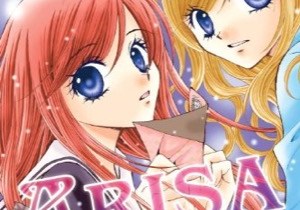Arisa Volume 1

I’d previously passed by this series, the newest from Natsumi Ando (Kitchen Princess), because of its lame-duck status, as one of the last releases from the now-departed Del Rey Manga. I recently picked up Arisa volume 1 on a whim (to fill out a mail order, if you must know), and now I’m glad i did, because it was a gripping and enjoyable read.
At first, it reminded me of Papillon. Both are about twin sisters, reunited after significant time apart and fascinated by the other’s life. However, while Papillon goes over the top with ridiculous, soap operatic clichés, Arisa instead takes a dark turn that captures how disturbing peer pressure can be.
Arisa and Tsubasa were separated due to a divorce, and each went with one parent. While they kept in touch via letters, Tsubasa has grown into “the Demon Princess” of her junior high, with a temper that comes out whenever she sees what she perceives as injustice. The tough guys are intrigued by her willingness to fight, but all Tsubasa wants is girly friends who find her nice instead of fearsome. When she and Arisa reunite in person, Arisa — outwardly perfect, class president, good student, popular, with an admirable, cool, athletic boyfriend and plenty of friends — proposes that Tsubasa go to Arisa’s school while pretending to be her.
Tsubasa jumps at the idea of trying on her dream life without wondering about Arisa’s motives. Tsubasa quickly discovers that all is not perfect in Arisa’s world, with a mysterious King leading the class in ostracizing those who don’t play along. Arisa is so troubled that she removes herself from the situation through drastic action, leaving Tsubasa determined to find out Arisa’s secrets and how she really felt by going undercover as her sister.
Of course, Tsubasa’s integrity and fearlessness will be crucial in discovering what scared Arisa so much. Tsubasa is helped by Takeru, one of her guy friends, and Manabe, the outsider in Arisa’s class. As in Ando’s previous series, she’s playing with the characters’ memories — in Kitchen Princess, the lead doesn’t remember which boy changed her life, while here, Tsubasa doesn’t have Arisa’s memories, and she’s trying to discover them through mimicking her life.
The art is very Ando — starry eyes, beautiful girls, full pages, emotion shown through flowing hair and big gesture. It’s very readable and quite packed at times, with lots to look at (if you can stand to slow down and wait to find out what happens next). There’s an interesting bonus feature showing early sketches of the characters, compared to how they look in the series. An additional extra has Ando, in comic strip form, introducing her new dog.
This is a multi-layered work, with younger readers sharing Tsubasa’s feelings about what life should be like and enjoying the mystery-solving and romantic plotlines. Older readers will recognize the underlying cruelty of popular kids and sympathize with Tsubasa’s sad recognition that she only knows her sister from the outside, missing out on knowing her hopes and fears and internal motivations. While it’s easy to imagine the achievers don’t have any concerns of their own, they can be quite fragile when things don’t go well for them, and Tsubasa’s tougher, more average life may have prepared her better to weather the storm. She cares less about what others think; her experiences have given her more self-possession and self-reliance.
It’s a particularly timely moment to be thinking about this series, since Arisa volume 2, now published by Kodansha Comics, is due out next week. I can’t wait! This is addictive shojo storytelling you don’t have to feel conflicted or embarrassed about.
